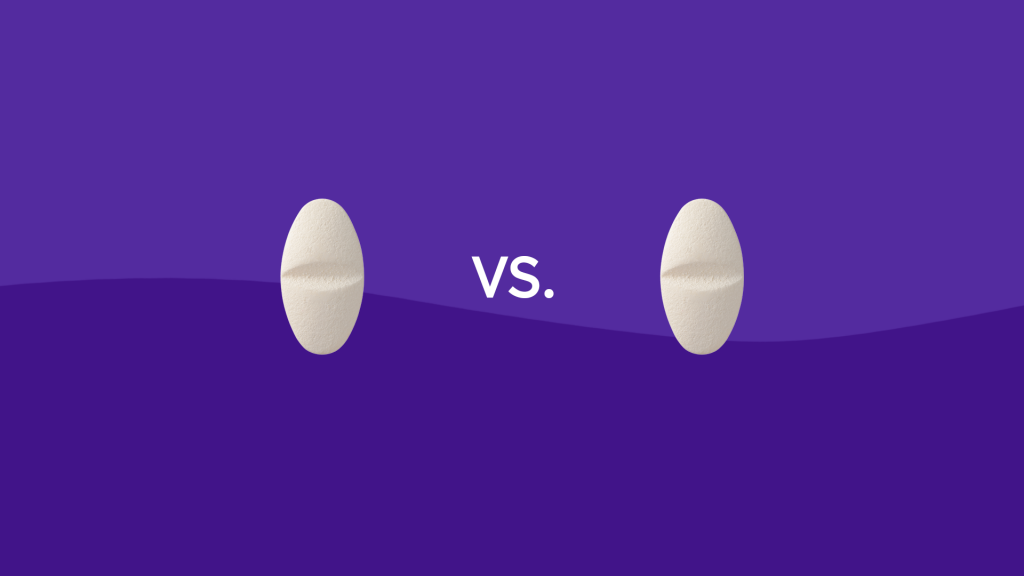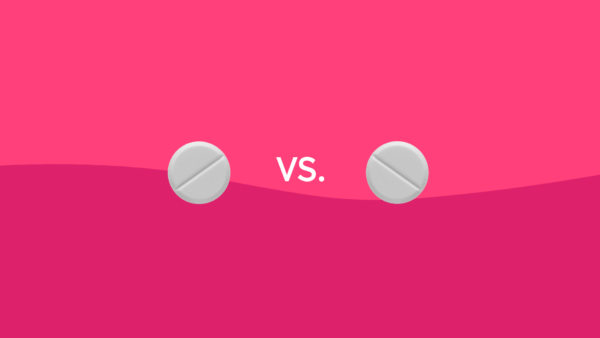Drug overview & main differences | Conditions treated | Efficacy | Insurance coverage and cost comparison | Side effects | Drug interactions | Warnings | FAQ
Nabumetone and ibuprofen are nonsteroidal anti-inflammatory drugs (NSAIDs) used to treat pain and inflammation from arthritis. Both nabumetone and ibuprofen are generic medications that work by blocking the release of prostaglandins, which are substances partly responsible for inflammation and pain in the body.
Ibuprofen may be a more familiar household name than nabumetone. However, both NSAIDs are effective for relieving pain and stiffness in the joints for those with osteoarthritis and rheumatoid arthritis. Continue reading to learn about other important differences between these drugs.
What are the main differences between nabumetone and ibuprofen?
Nabumetone is the generic name for the now discontinued, Relafen. It is available with a prescription from a doctor and primarily used to treat pain from osteoarthritis and rheumatoid arthritis. Generic nabumetone tablets are available in strengths of 500 mg and 750 mg. The typical dosage of nabumetone is up to 2000 mg per day taken as a once-daily or twice-daily dose.
Ibuprofen is known by popular brand names like Advil and Motrin. Unlike nabumetone, ibuprofen is available as a prescription or over-the-counter (OTC) pain reliever. While ibuprofen can treat pain from arthritis, it is also labeled to treat fever, menstrual pain, and pain from headaches or backaches. Ibuprofen is usually taken every six to eight hours depending on the strength and formulation.
| Main differences between nabumetone and ibuprofen | ||
|---|---|---|
| Nabumetone | Ibuprofen | |
| Drug class | Nonsteroidal anti-inflammatory drug (NSAID) | Nonsteroidal anti-inflammatory drug (NSAID) |
| Brand/generic status | Generic available; brand name discontinued | Brand and generic available |
| What is the brand name? | Relafen | Advil, Motrin, Midol |
| What form(s) does the drug come in? | Oral tablet | Oral capsule Oral tablet Oral liquid Injection (NeoProfen) |
| What is the standard dosage? | 1000 to 2000 mg per day divided into one or two doses | 1200 to 3200 mg per day divided into three or four doses |
| How long is the typical treatment? | Treatment duration depends on health condition, severity of pain, and other factors. Treatment may be short-term or long-term. | Treatment duration depends on health condition, severity of pain, and other factors. Treatment may be short-term or long-term. The OTC form of ibuprofen should not be taken longer than 10 days without consulting a healthcare provider. |
| Who typically uses the medication? | Adults | Adults and children 6 months and older |
Conditions treated by nabumetone and ibuprofen
Nabumetone and ibuprofen are both FDA approved to treat mild to moderate pain and inflammation from osteoarthritis and rheumatoid arthritis. Osteoarthritis and rheumatoid arthritis are chronic conditions that affect the joints; however, osteoarthritis is characterized by the breakdown of cartilage around the joints over time whereas rheumatoid arthritis develops when the immune system attacks the joints.
As NSAIDs, nabumetone and ibuprofen can also treat mild to moderate pain. More specifically, NSAIDs can treat headaches, musculoskeletal pain around the neck, and lower back pain. While ibuprofen is FDA approved to treat pain, fever, and menstrual cramps (primary dysmenorrhea), nabumetone may be used as an off-label treatment.
| Condition | Nabumetone | Ibuprofen |
| Osteoarthritis | Yes | Yes |
| Rheumatoid arthritis | Yes | Yes |
| Pain | Off-label | Yes |
| Fever | Off-label | Yes |
| Primary dysmenorrhea | Off-label | Yes |
Is nabumetone or ibuprofen more effective?
Nabumetone and ibuprofen are effective NSAID pain relievers when used as prescribed. Both drugs have been FDA approved to treat pain and inflammation from arthritis. The more effective NSAID is the one that works best for your specific condition and symptoms.
In a randomized, controlled clinical trial, nabumetone was compared to other NSAIDs like ibuprofen, naproxen, and diclofenac in around 4,000 patients with osteoarthritis or rheumatoid arthritis. After 12 weeks of treatment, researchers found that nabumetone was similar in effectiveness to ibuprofen and other NSAIDs when treating osteoarthritis. However, the study found that nabumetone was more effective than the other NSAIDs for rheumatoid arthritis.
Nabumetone generally takes longer to work than ibuprofen and other NSAIDs. It usually takes around one week for nabumetone to start working and up to two weeks for complete symptom relief. On the other hand, ibuprofen starts working within 30 minutes to an hour, although it may need to be taken several times per day for complete relief.
Consult your healthcare provider for medical advice on the best pain reliever for you. Your healthcare provider may prescribe over-the-counter or prescription drugs to help treat your pain.
Coverage and cost comparison of nabumetone vs. ibuprofen
Most Medicare and insurance plans will cover generic nabumetone. The copay for nabumetone will depend on the insurance plan but can range from $0 to $57. Without insurance, the average cash price of nabumetone is around $79.99. With a SingleCare nabumetone coupon, you save on the drug price and pay around $19.
Most insurance plans will not cover the over-the-counter version of ibuprofen. However, with a prescription, most Medicare and insurance plans will cover ibuprofen. The average retail price of ibuprofen is around $50 for 30 prescription-strength tablets. Using a SingleCare ibuprofen coupon card (prescription required) may help lower the cost of ibuprofen.
| Nabumetone | Ibuprofen | |
| Typically covered by insurance? | Yes | Yes |
| Typically covered by Medicare Part D? | Yes | Yes |
| Quantity | 60 tablets, 500 mg | 30 tablets, 800 mg |
| Typical Medicare copay | $0–$57 | $0–$22 |
| SingleCare cost | $19+ | $5+ |
Common side effects of nabumetone vs. ibuprofen
Nabumetone and ibuprofen can cause similar side effects. The most common side effects of these NSAIDs are gastrointestinal side effects, like indigestion, diarrhea, and constipation. Compared to ibuprofen, nabumetone may have a higher chance of causing indigestion, abdominal pain, and diarrhea.
Other possible side effects of nabumetone and ibuprofen include nausea, dizziness, swelling in the hands or feet (edema), headache, rash, and tinnitus.
Serious side effects of nabumetone and ibuprofen may include high blood pressure, kidney problems, heart attack, stroke, and stomach or intestinal ulcers. Allergic reactions are also possible. Seek immediate medical attention if you experience serious side effects or side effects that persist or worsen.
| Nabumetone | Ibuprofen | |||
| Side effect | Applicable? | Frequency | Applicable? | Frequency |
| Indigestion | Yes | 13% | Yes | 1%–3% |
| Abdominal pain | Yes | 12% | Yes | 1%–3% |
| Diarrhea | Yes | 14% | Yes | 1%–3% |
| Nausea | Yes | 3%–9% | Yes | 1%–3% |
| Constipation | Yes | 3%–9% | Yes | 1%–3% |
| Dizziness | Yes | 3%–9% | Yes | 1%–3% |
| Edema | Yes | 3%–9% | Yes | 1%–3% |
| Headache | Yes | 3%–9% | Yes | 1%–3% |
| Rash | Yes | 3%–9% | Yes | 1%–3% |
| Tinnitus | Yes | 3%–9% | Yes | 1%–3% |
Frequency is not based on data from a head-to-head trial. This may not be a complete list of adverse effects that can occur. Please refer to your doctor or healthcare provider to learn more.
Source: DailyMed (Nabumetone), DailyMed (Ibuprofen)
Drug interactions of nabumetone vs. ibuprofen
NSAIDs should be used with caution with drugs like warfarin and aspirin. Taking anticoagulants or antiplatelet drugs with NSAIDs can increase the risk of gastrointestinal bleeding and ulcers.
NSAIDs have the potential to increase blood pressure. Therefore, the effects of blood pressure lowering medications, such as lisinopril and losartan, may be reduced if NSAIDs and blood pressure medications are taken together.
Nabumetone and ibuprofen can decrease the effects of diuretic medications. Kidney function may need to be monitored while taking NSAIDs and diuretics together.
Taking nabumetone or ibuprofen with lithium or methotrexate can lead to accumulated levels of lithium or methotrexate in the body. This could lead to lithium or methotrexate toxicity.
This is not a complete list of possible drug interactions.
| Drug | Drug class | Nabumetone | Ibuprofen |
| Warfarin | Anticoagulant | Yes | Yes |
| Aspirin | Antiplatelet | Yes | Yes |
| Lisinopril Captopril Ramipril |
Angiotensin-converting enzyme (ACE) inhibitor | Yes | Yes |
| Losartan Valsartan Olmesartan |
Angiotensin receptor blocker (ARB) | Yes | Yes |
| Furosemide Hydrochlorothiazide |
Diuretic | Yes | Yes |
| Lithium | Mood stabilizer | Yes | Yes |
| Methotrexate
Pemetrexed |
Antimetabolite | Yes | Yes |
Consult a healthcare professional for other possible drug interactions.
Warnings of nabumetone and ibuprofen
Nonsteroidal anti-inflammatory drugs (NSAIDs) can increase the risk of cardiovascular events, such as heart attack and stroke. Those with heart disease or risk factors for heart disease, such as high blood pressure or high cholesterol, should avoid NSAIDs or use them with caution.
Medications like nabumetone and ibuprofen can also increase the risk of gastrointestinal events, including ulcers and intestinal bleeding. Elderly patients and those with a history of gastric ulcers should avoid NSAIDs or use them with caution. The incidence of gastrointestinal bleeding may be slightly lower with nabumetone than with ibuprofen.
NSAIDs may cause fluid retention, or edema, and worsening of heart failure. Caution should be advised in patients with a history of heart failure.
Long-term use of NSAIDs may cause damage to the kidneys over time. Consult your healthcare provider if you have a history of kidney problems before using NSAIDs. Talk to your doctor about other possible side effects or adverse events before using NSAIDs, such as nabumetone or ibuprofen.
Frequently asked questions about nabumetone vs. ibuprofen
What is nabumetone?
Nabumetone is a generic NSAID analgesic, or pain reliever. It is the generic name for Relafen, and can only be obtained with a prescription. Nabumetone is usually taken once or twice daily as an oral tablet to treat osteoarthritis and rheumatoid arthritis.
What is ibuprofen?
Ibuprofen works as an NSAID to relieve pain and inflammation caused by osteoarthritis or rheumatoid arthritis. Although it is available as an over-the-counter medication to treat pain and fever, it can also be prescribed in higher strengths to treat more severe pain. Ibuprofen comes as an oral tablet, liquid solution, capsule, and injection. Brand names of ibuprofen include Advil and Motrin.
Are nabumetone and ibuprofen the same?
Nabumetone and ibuprofen are not the same. Although they are both NSAID pain relievers, nabumetone and ibuprofen are dosed differently and may have slightly different effects. Nabumetone, which requires a prescription, can be taken once daily while ibuprofen, which is available over the counter, is usually taken multiple times throughout the day. Both nabumetone and ibuprofen can treat chronic pain from arthritis.
Is nabumetone or ibuprofen better?
Compared to placebo, or no treatment at all, nabumetone and ibuprofen are both effective for treating pain and inflammation from arthritis. Nabumetone may be preferred for its once- or twice-daily dosing. However, nabumetone may have the potential to cause more indigestion than ibuprofen, and it is only available with a prescription. The better NSAID is the most cost-effective treatment for you as determined with the help of your doctor.
Can I use nabumetone or ibuprofen while pregnant?
Nabumetone and ibuprofen, like other NSAIDs, should be avoided during late pregnancy. Taking NSAIDs during late pregnancy may increase the risk of birth defects and miscarriage. Consult your healthcare provider if you are breastfeeding before taking NSAIDs.
Can I use nabumetone or ibuprofen with alcohol?
Drinking alcohol in moderation while taking nabumetone or ibuprofen as prescribed is generally safe. Problems may start when long-term NSAID use is combined with excessive consumption of alcohol. Regularly drinking alcohol with NSAIDs may lead to an increased risk of stomach ulcers, kidney impairment, and other adverse side effects.
How long does it take for nabumetone to work?
It can take one week to start feeling the effects of nabumetone. In some cases, it can take two weeks or longer to feel maximum relief with nabumetone.
Is nabumetone like tramadol?
Nabumetone is a nonsteroidal anti-inflammatory drug while tramadol is an opioid. Tramadol is considered a more potent pain reliever than nabumetone. Compared to nabumetone, tramadol is used to treat more severe forms of pain.
Does nabumetone cause weight gain?
Nabumetone does not normally cause weight gain as a common side effect. Weight gain from nabumetone may indicate fluid retention or a worsening of heart failure. Consult your healthcare provider immediately if you experience unusual weight gain or swelling in the hands or feet.





